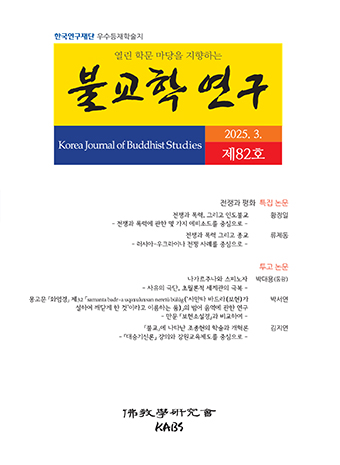투고논문
Abstract
References
Information
This paper attempts to clarify the context of the Buddhist critique against the omniscience (sarvajñatva) of Mahāvīra in the soteriological context of the earliest Buddhism in India. Based on the scholarly achievements of J. Gonda and P. Jaini, it will be illustrated that the adoption of the omniscience of the Buddha was an unnatural borrowing from the Jaina tradition into the Buddhist tradition due to the competitive pressure caused by Jainism. It will also be shown that the connotation of the term “sarva” in the sense of “complete” has made it easier for the Buddhists to transform the meaning of the term for easy adoption on their part. Furthermore, in the description of the enlightenment of Mahāvīra, the basic dualistic ontological structure will be identified in contrast to that of the Buddha, in which other kinds of knowledge, namely three vidyās (tevijja), are counted. This contrast makes the context evident of why the Buddhists consider the deterministic understanding of the Jains about the world ridiculous. But considering the basic dualistic ontology behind the deterministic view of Jainism, the Jaina understanding of the deterministic character of the world reported in the Sandakasutta deserves much more careful interpretation. The case of Sarvajñasiddhinirdeśa chapter of the Madhyamakahṛdaya which reports the inverted attack from Jains against the omniscience of the Buddha makes this need more urgent.
본 논문은 (최)초기불교에서 붇다 자신이 명확하게 비판하고 거리를 두던 전지자(sarvajña, 一切知者)로서의 지위에 대한 태도의 맥락을, 자이나전통과의 긴장관계 때문에 이루어진 부자연스러운 차용이었다는 출발점에서 설명하고, 그 이면에는 “모든 것을 안다”고 할 때의 “모든 것”(sarva, 一切)의 어원적이고 문화사적인 의미가 이러한 차용을 가능하게 했다는 점을 밝히면서 시작한다. 이 점을 해명해 낸 J. Gonda와 P. Jaini의 연구업적을 전제로 하고, 왜 자이나전통에서는 마하비라(Mahāvīra)가 전지자로 상정될 수밖에 없었는지에 대해 자이나전통의 해탈론을 중심으로 그 이원론적 맥락을 밝히게 될 것이다. 이 맥락 안에서 전지자가 되는 일이 마하비라가 도달했다는 “nirvāṇa”혹은 “mokṣa” 라고 불리는 경지에 대한 이해와 직접 연관된다는 것을 지적하고자 한다. 이렇게 해탈론과 연관시켜 논의를 진행시키는 것은 붇다가 전지자여야 할 필요성을 느끼지 못했던 이유는 물론이고 마하비라의 전지자로서의 지위가 함축하고 있는 결정론(determinism)적 관점을 불교도들이 조소적으로 바라보게 되었던 이유를 해명하는 가장 적확한 길이라고 생각하기 때문이다.
또한 이 측면에서 마하비라가 가졌던 것으로 보이는 결정론적인 관점이 보다 진지한 철학적인 고려의 대상이 되어야 할 필요가 있다는 점을 밝히고, 이 문제가 인도철학사 전반을 관통하는 이원론의 핵심 문제라는 점을 언급하고자 한다. 초기불교에서 조소의 대상이 되었던 문제가, 나중에 바비베까(Bhāviveka)의 저술에 가서는 거꾸로 자이나교도들이 전지자로서의 붇다를 비판하는 근거로 등장한다는 사실만 보더라도 이 맥락은 쉽게 간과할 만한 것이 아니다. 그리고 이와 함께 불교전통 내부에서 꿰뚫어 알아차림(prajñā)을 중심으로 해탈에 대한 교리체계를 재구성하던 전통이 후대에 붇다의 전지자로서의 지위를 수용하는 일에 힘을 실었을 것이라는 필자의 추정을 제시한다.
-
약호 및 원전자료
- Hermann Jacobi, Jaina Sūtras Translated from Prākrit. Part I: The Ākārāṅga Sūtra The Kalpa Sūtra, Oxford: Oxford University Press, 1884 [reprint, Delhi: Motilal Banarsidass 1980].
- Hermann Jacobi, The Āyāraṃga Sutta of The Śvetāmbara Jains Part I: Text, London: Pali Text Society, 1882.
- Hermann Jacobi, Jaina Sūtras translated from Prākrit Part II The Uttarādhyayana Sūtra, The Sūtrakṛtāṅga Sūtra, Delhi: Motilal Banarsidass, 1995 [original, Oxford University Press, 1895]. 2차 자료 <단행본>
- Andrew J. Nicholson, Unifying Hinduism Philosophy and Identity in Indian Intellectual History, New York: Columbia University Press, 2013.
- Helmuth von Glasenapp, The Doctrine of Karman in Jain Philosophy, G. Barry Gifford tr., Bombay: Bai Vijibai Jivanlal Panalal Charity Fund, 1942.
- Padmanabh S. Jaini, The Jaina Path of Purification, Delhi/Varanasi/Patna: Motilal Banarsidass, 1998 [original, Berkeley/Los Angeles/London: University of California Press, 1979].
- Padmanabh S. Jaini, Gender and Salvation: Jaina Debates on the Spiritual Liberation of Women, Berkeley: University of California Press, 1991.
- Paul Dundas, The Jains 2nd ed., London/New York: Routledge, 2002.
- Piotr Balcerowicz, Early Asceticism in Inda Ājīvikism and Jainism, London/New York: Routledge, 2016.
- Sara L. McClintock, Omniscience and the Rhetoric of Reason Śāntarakṣita and Kamalaśīla on Rationality, Argumentation, and Religious Authority, Boston: Wisdom Publications, 2010.
- Walther Schubring, Die Lehre der Jainas nach den alten Quellen dargestellt, Berlin/Leipzig: Walter de Gruyter, 1935. <논문>
- 강성용. 「“Pramāṇa”와 “Pratyakṣa”에 대하여」, 『인도철학』제16집, 서울: 인도철학회, 2004, pp.129-148.
- Analayo, “The Buddha and Omniscience”, The Indian International Journal of Buddhist Studies Vol.7 (2006), pp.1-20.
- Collette Caillat, “Gleanings from a Comparative Reasoning of Early Canonical Buddhist and Jaina Texts”, Journal of the International Association of Buddhist Studies Vol.26 (2003)
- David N. Lorenzen. “Who Invented Hinduism?”, Comparative Studies in Society and History Vol.41.4, 1999, pp.630-659.10.1017/S0010417599003084
- Ferenc Ruzsa, “Sāṃkhya: Dualism without Substances”, Indian Epistemology and Metaphysics, ed. Joerg Tuske, London: Bloomsbury, 2017, pp.153-181,
- Jan Gonda, “Reflections on sarva- in Vedic Texts”, Indian Linguistics Vol.16, 1955, pp.53-71 [reprint, Selected Studies J. Gonda Vol.2: Sanskrit Word Studies. Leiden: E. J. Brill 1975, pp.495-513].
- Johannes Bronkhorst, “The Riddle of the Jainas and Ājīvikas in Early Buddhist Literature”, Journal of Indian Philosophy Vol.28, Kluwer Academic Publishers, 2000, pp.511-529,10.1023/A:1017500901500
- Karin Preisendanz, “On ātmendriyamanorthasannikarṣa and the Nyāya-Vaiśeṣika Theory of Vision”, Berliner Indologische Studien Vol.4/5, Berlin, 1989.
- Lambert Schmithausen. “On Some Aspects of Descriptions or Theories of ‘Liberating Insight’ in Early Buddhism”, Studien zum Jainismus und Buddhismus, Gedenkschrift für Ludwig Alsdorf, hrsg. K. Bruhn und A. Wezler, Wiesbaden, 1981, 199-250.
- Padmanabh S. Jaini, “On the Sarvajñatva (Omniscience) of Mahāvīra and the Buddha”, Buddhist Studies in Honour of I. B. Horner eds. L. Cousins et al. Dordrecht: D. Reidel Publishing Company 1974, pp.71-90. [reprint, Collected Papers on Buddhist Studies. ed. by Padmanabh S. Jaini, Delhi: Motilal Banarsidass. 2001, pp.97-121].10.1007/978-94-010-2242-2_9
- Paul J. Griffiths, “Omniscience in the Mahāyānasūtrālaṅkāra and Its Commentaries”, Indo-Iranian Journal Vol.33, Kluwer Academic Publishers, 1990, pp.85-120.10.1163/000000090790083220
- Walther Schubring. Die Lehre der Jainas nach den alten Quellen dargestellt. Berlin/Leipzig: Walter de Gruyter & Co. 1935.
- Sin Fujinaga, “Why Must There Be an Omniscient in Jainism”, Studies in Jaina History and Culture Disputes and Dialogues ed. Peter Flügel. London/New York: Routledge, 2006, pp.107-116.
- Publisher :Korean Association of Buddhist Studies
- Publisher(Ko) :불교학연구회
- Journal Title :Korean Journal of Buddhist Studies
- Journal Title(Ko) :불교학연구
- Volume : 60
- Pages :81-111


 Korean Journal of Buddhist Studies
Korean Journal of Buddhist Studies






